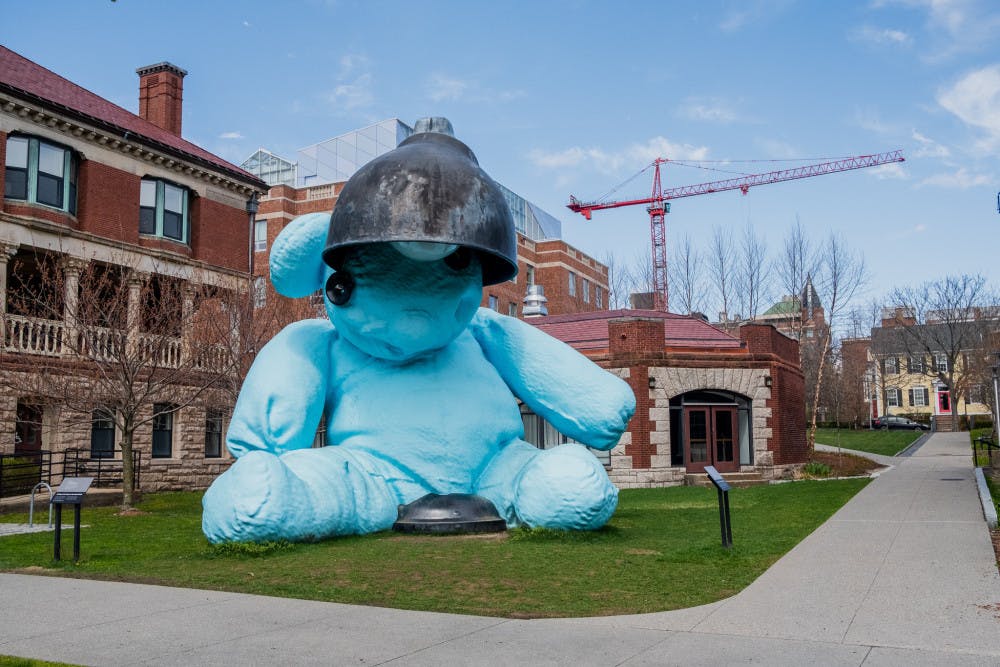Updated 7:40 P.M., August 17, 2020
Urs Fischer’s 2006 sculpture “Untitled (Lamp/Bear),” one of campus’ most divisive and lurid examples of public art, is preparing to make its exit from Ruth J. Simmons Quadrangle “over the coming weeks” after more than four years since its June 2016 arrival.
The Committee on Public Art announced the premature “graduation” of the sculpture, more commonly referred to as Blueno, in Today@Brown. The sculpture was originally intended to remain on campus for five years until mid-2021, according to the Providence Journal.
The contemporary blue sculpture has become a part of campus culture in its short tenure in Providence. Both College Hill confessional Facebook pages “Dear Blueno” and “Blueno Bears Admirers” are named after the bear sculpture.
“For many of us, it feels as if the sculpture became a true Brunonian during its time here,” Dietrich Neumann, chair of the Committee on Public Art and professor of History of Art and Architecture, and Jo-Ann Conklin, director of the David Winton Bell Gallery, wrote in a joint statement announcing Blueno’s departure. When the sculpture first arrived on campus, it was widely criticized for its cost and the financial and legal transgressions of its donor, as well as its appearance. But many have since celebrated the statue for its vibrant, childlike character.
Neumann and Conklin invited community members to share a “personal Blueno homage — whether it's a selfie, a sketch or painting, a video, a meme or a story” by Aug. 24 through an email to blueno-tributes@brown.edu or a social media post using the hashtag #ByeByeBlueno.
After bearing four years of New England weather while it was on loan from the collection of Steven and Alexandra Cohen, Fischer’s sculpture “will be decommissioned and moved to a location ideal for its long-term conservation,” according to the Today@Brown announcement.
Neumann told The Herald that the concern that Blueno might not survive another Providence winter motivated the decision to remove the sculpture ahead of the planned summer 2021 date. “This was ultimately the donor’s call, and it was really about being respectful to the work of art and the artist,” he explained. Neumann added that although many solutions were run by the committee, it was eventually determined that the complex material of the lacquered bronze sculpture inhibited an on-site restoration.
Compared to its canary yellow, Qatari twin who is kept indoors at Hamad International Airport, Blueno has sustained considerable damage due to its outdoor exhibition. The donor, Steven Cohen, “kept track of the deterioration, and he had a gallerist with whom I talked to,” Neumann said. “We all tried to find solutions to keep him here longer, but the owner basically made the decision that it was better to take him and have him fully restored.”
When Fischer came to campus to offer a talk on his artwork in 2016, he told the audience: “Individual artwork can resonate in your mind. And art is our collective memory.” As Brown community members prepare for Blueno’s farewell, Fischer’s 2016 musings ring true: Blueno will remain within Brown’s collective memory, even in its absence.
“There are a lot of more important things happening in the world right now, but art does have a community-building quality, and a lot of students were attached to Blueno,” said Grace Reed ’22 in response to the announcement.
Some students never quite warmed up to the blue, button-eyed bear, though, and still had staunchly negative opinions on both the symbolic and aesthetic dimensions of the multi-story statue.
”Blueno is a materialized emptiness; a terrible object whose frightening nothingness helps us understand how our intersubjective meaning is simply the effect of place within a structure,” said Andy Rickert ’21. “It’s also really ugly.”
Yet, Reed noted that she appreciated Fischer’s sculpture precisely because of the humorous controversy the sculpture spawns. “At first there was this controversy of ‘do we like Blueno or not?’ So it became sort of a cultural centerpiece,” she said.
Impassioned fans of Blueno rose to protest the sculpture’s removal earlier this year, creating a mock Facebook event called “Protest Blueno's removal by lying down in front of the bulldozer.” The event, originally scheduled to protest the 2021 removal, has over 740 people marked as “going” or “interested” — many more supporters than a petition that circulated in 2016 calling for Blueno’s immediate removal, which garnered 178 signatures.
The Committee of Public Art recognizes the sculpture's cultural relevance. Neumann emphasized that the decision to remove Blueno “was not taken lightly, and we really tried to do everything we could to keep him.” In terms of what might come to replace Blueno as Brown’s next public art installation in the near future, the committee has yet to decide. The discussion began in a committee meeting today, which centered around possible artists and how students might also be involved in the eventual decision process.
Neumann described the process of acquiring art for campus as two-pronged: “Either we go out and actively look for works of art, and see if we can afford a loan and installation, which is very expensive. Or, if we are lucky, a donor comes forward who has a great art collection, which is what happened with Blueno,” he said.
As an installation, Blueno was deliberately chosen as an effigy of the University’s culture. “It was a quirky and surrealist art that fits very well into our campus because it was a bear,” Neumann recalled. Back when Blueno was being vetted, Neumann said the sculpture felt “representative of the creative mindset that is so prevalent on campus. … I knew then that everyone would fall in love with him and that he would become a sort of mascot of Brown.”

ADVERTISEMENT




